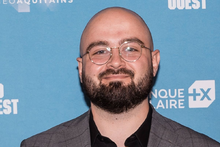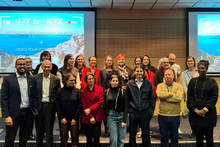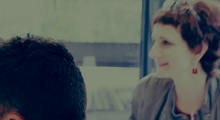2024 is all about you: your successes, your...

Corinne, a Kedger living in Sao Paulo, meets students of the KAS Pro-Act project
Five students of the "KEDGE Alumni Success" Pro-Act are currently in South America, where they have gone to meet our graduates.
Could you tell us about your educational background, and what you studied at Kedge? What programme did you take at KEDGE?
I’m originally from Landes. I did my prep classes in Bordeaux, which allowed me to attend Sup de Co Marseille (which is now KEDGE Marseille) in 1992. I graduated in 1995. At the time, university programmes lasted three years, and gap years did not exist like they do today.
I spent my second year in Sao Paulo doing a university exchange. It was a new exchange programme, and I was the third student from KEDGE to complete an entire school year in Brazil. Double degrees didn’t exist before that. I did two internships that year (at Grofilex in an economic expansion position) at the same time as taking evening classes at the university, which was very common here although it was new to me. In order to get a higher education, many Brazilians did their internship during the day and took classes at night. I returned to Marseille to finish my third year, and then finished my final year with an internship in Paris.
After that, I came back to Brazil permanently. When I got here, I got another job working in an economic expansion position because it was easy to get a freelance job. After a few months, I got a permanent position as a Marketing and Communications Assistant with Schneider Electric in its South American office. After that, I transferred to the Brazil office and worked for several years as a Product Head, responsible for market intelligence and communications. In 2009, I left so I could get a specialisation, and to do a post graduate degree, which is the equivalent of a DESS (a higher studies specialisation degree) in competitive intelligence. I worked for myself while I was getting my specialisation, but that didn’t work out even though that time was productive in terms of networking. I quickly realised that I preferred the structure of a company, where there are fewer highs and lows, especially since, as a consultant, you have one project one day, and a different one the next.
In the end, Schneider called me back! The company had really developed in the matter of organisation, which is why I decided to come back in 2011 and I’ve never left.
To summarise (laughs), I was responsible for strategic planning. I worked on several acquisition files, was a “Pressing Manager”, worked on process marketing, and contributed to the growth of business intelligence and digital in the company. I also dealt with simplification, commercial efficiency, and cost reduction. As you can see, I had a very transversal and rich role. I worked with everyone in the company, in Brazil and then all over in South America, on all of the above matters. For the last month, I've been working full-time as Efficiency Director, on all issues of organizational productivity, better cost management, and business productivity – so all matters that affect efficiency and have an impact on the bottom line.
Why did you decide to go live in Sao Paulo? Did you really want to go, or was it just that an opportunity came up and you seized it?
I wanted to move to Brazil for personal reasons. In1991, I took a solo trip to Rio as a tourist. I met my husband and we decided to live together then got married because, at the time, the only way to get a Brazilian visa was through marriage. He followed me back to Marseille during my first year, then to Sao Paulo when I did my exchange, and then back to Marseille for the year I did my Master 2.
I had enormously valued the exchange I did in Sao Paulo during my second year, so my husband and I decided to come back to Brazil after I got my degree. I had always wanted to live abroad and have always loved foreign languages. I didn’t speak either Portuguese or Spanish when I arrived in Brazil. I spoke better German (laughs), but I really had a very strong desire.
It was the curiosity more than anything. I profoundly wanted to get out of Landes (laughs). I had a strong desire to be open-minded. Especially since I didn’t know anything about Sao Paulo. The city was very “cold” at the time. It wasn’t easy to fit in, I didn’t have a car, and it was difficult to get around because we didn’t have Google maps (laughs). I came just as the internet was getting popular, so we didn’t have the same ways as we do today to find information, but I had the help of my Brazilian husband, who made things easier. Nothing like what it’s like today. (laughs). At the time, we were less stressed at work (laughs), we didn’t have either the internet or mobile phones so at home in the evenings we were completely disconnected.

What differences do you distinguish between the manner of working in Brazil compared to France?
There are a lot of differences. Here, relationships are a lot more informal. The Brazilians are naturally more spontaneous, warmer, and open. You can talk to anyone on the street very easily. People are approachable, and it’s not any different at work. You have to know how to reach out to people and win them over professionally. You have to first know how to put them at ease. When you first meet them, you don’t talk about work. You ask them questions about where are they from, their families, if they have children, what is their favourite football team, etc. In short, you have to establish contact in a mild manner.
Even on a daily basis, you mustn’t limit yourself to formal meetings. A lot of things are handled in the cafes, even more here than in France. I often work at my home office, but sometimes I go to the office to meet people and make rounds in the cafe because I know that that’s where I will collect the most information. You can find out things and solve a lot more things in those times. You can’t under-estimate that in Brazil.
The working atmosphere in companies is excellent and that counts for a lot on a day-to-day basis. You feel good. What’s more, the Brazilians love France. As an example, the University of Sao Paulo was founded with the help of the French.
What is also different is the view of hierarchy in a company is less marked here than it is in France. I have employees in my team who are my friends. Of course, you have to know how to be firm in your demands, but if you are too distant, you’ll lose your connection. You don’t accomplish getting the performance you want by reproaching them, you must know how to do it gently, because the French is more direct. You also can’t generalize because there are also multicultural Brazilians who have lived in France. Additionally, the Brazilians know how to adapt.
One thing that irritates the French is that Brazilians are not very thorough in managing projects, and they don’t like to write. Here, you have to be strict if you want things to be clean and clear. I have to formally ask for them. Writing meeting reports are not done automatically here, while in France we know very well that, without meeting reports, efficiency is lost in the carrying out of actions. When you are culturally French, or if you’re an expatriate, you have to enforce it. We say that productivity and efficiency are not their priority, (laughs), human relationships come first.
There is also the issue of time management. Brazilians usually do everything at the last moment - you have to set all the deadlines at least a week before the actual deadline. But the advantage with Brazilians is that they are much more flexible and less disturbed by the unexpected. Brazilians are less methodical so it’s not a catastrophe if things do not go as planned. They take things with ease and know how to reorganise.
Brazilians are very enthusiastic employees, and it’s easy to get them to work on new projects.
Finally, when we combine the qualities of French and Brazilians, we can build some high-performance teams. The extremes are balanced out (laughs).

What are your plans for the future? Where do you see yourself in 5 years? In 10 years?
The position I currently hold is a professional project that I’ve been working on for a year, and which was finally accepted this year. It is to do the following: look at the efficiency in my company and manage in a more holistic way, because our main goal is productivity. You must know that Brazil has the lowest productivity rate in the world. It has major infrastructure deficiencies, significant administrative and fiscal constraints, and has high costs. It’s not difficult to find qualified personnel. However, individual productivity is lower than in France and in many other countries. This is an issue that I wanted to address as a professional project. I am giving myself three years to help the company achieve at least the average performance of developing countries.
Obviously, I'm wonder what I'm going to do tomorrow, especially since I have 25 years of experience in the business (laughs). Do I stay in Brazil? Am I going back to France? I haven’t decided yet, I must also make plans with my companion. I don’t have a definitive answer, but it is a question that I ask myself. I have been involved more recently in mentoring programs to approach young graduates and professionals to help them progress in their careers. My company has given me this opportunity so I feel more and more invested in this kind of action. Will I continue in my business? Elsewhere? I don’t have a clear vision for the long run. I think about it because working in a company is comfortable, but is very demanding. I have many other interests that I cannot pursue right now because I don’t have the time. The answer might be to go back to a consultant position, even if it is less stable financially. But I’m preparing myself. If you plan to stay in Brazil, you can’t count on the help of the government. There is no unemployment or health insurance, and there are costs. So it’s necessary to count on your savings. I’m trying to plan for that. Thanks to my current salary, I am able to save money to have that freedom later.
So I’ll work at least another two or three years more with this company, and work on other projects afterwards.
How did KEDGE help you achieve your goals after you moved to Brazil?
The main opportunity has been KEDGE’s partnership with the University of Sao Paulo. If this programme had not existed, it would have been more difficult. But when I first came, there were very few alumni here, and there wasn’t an Alumni network branch, so we weren’t able to rely on the network.
It’s only recently, three years, that afterworks have taken place, and where I’ve been able to meet up with former graduates. Because of those, I’ve helped a few people from KEDGE, like Daiane (an Alumnus also interviewed) who I put in touch with some people to help with her doctorate.
Did you have any apprehensions before you left?
I didn’t have too many because I was lucky to be accompanied by my husband at the time, and back then I had nothing to lose (laughs). I wasn’t particularly anxious (laughs). You know, I had already come to Brazil by myself at age 19, so moving here with someone else was no problem.

What advice can you give to a young KEDGE graduate who is hesitant to start a career in Latin America?
If the expectation is to work in Brazil, I recommend getting a double diploma and doing an exchange to practice the language and soak up the culture before throwing yourself into the job market.
But it can be very risky if you come to Brazil unprepared and plan to find an internship or a job. There are many requirements, particularly with regards to visas, employment contracts and internships. They are quite strict. Brazil is struggling to open its labour market for the moment. According to statistics, the share of foreigners in Brazilian companies is low, but the latter is more significant in multinational companies due to cultural mixing. If you are thinking about coming to work in Brazil, it is better to come as a student to do an internship and to get a foothold in the local professional world.
Prepare for your visit well. For me, the best way to get a first job in Brazil is to do a VIE. Otherwise, working for a multinational company in France and then moving to Brazil can also be a good way, because multinationals have programmes that help young talent to advance and end them to higher posts abroad. We do it a lot at Schneider.
It’s necessary to prepare for your move and establish relationships so you can make contacts and get hired more easily. Use the Alumni network, it's very significant.
Another tip: don’t be afraid! The image of Brazil given by the media is not always very faithful to reality. Although there is some insecurity, I’ve lived here for 25 years and have never been a victim of aggression. I walk freely and without any worry. We live normal lives in Brazil, especially since security has improved in recent years.
Finally, you have to come with an open and knowledgeable mind about management and employment in Brazil.
What do you think are the growth sectors in this country? For example, are there positions for new graduates?
The profitable sectors in Brazil are those driven by global trends, but we’re few years behind.
Here, you have the digitization of companies like Uber and Amazon who are recruiting as fast as they can. Digital is booming here, as it is elsewhere.
There is also the health sector. The Brazilian population is very young, younger than the one in Europe, it is aging is booming. The average working age here is 30, while France has more of a white-haired culture (laughs).
In addition, there is the renewable energies sector. Brazil is a country that has a high potential in solar energy. But hey, oil still has very nice days in front of it here.
You mustn’t also forget that Brazil is one of the countries with the greatest agricultural resources. It is one of the largest exporters of red meats, chicken, fruits, and minerals.
Finally, Brazilians love innovation. They are very creative, so there are constantly new trends here.
Regarding the availability of internships, my company has annual internship programmes. Recruitment is done by specialised external companies, which are very structured in their recruitment procedures. You have to register on the internet and take online tests. Brazil has great potential. It is the tenth largest economy in the world, so I recommend KEDGE have a local representative who can approach companies, explain the benefits of having a double degree, and try to partner with companies so they can offer internships that meet French requirements. The SMEs and start-ups are more likely to hire trainees here.

What did you find here that you would not find in France?
The business world is warm and friendly. We celebrate a lot of birthdays in the company (laughs). As for me, my office has been decorated on every one of my birthdays; it's sacred here – no one can escape it (laughs). In France I didn’t find the same friendliness and kindness as there are in Brazilian relationships.
There is more turnover here than in France. Brazil is a young country so there’s more energy, more optimism, and more dynamism. You never get discouraged, even after years of crisis and restructuring. People are in a good mood under all circumstances. On the other hand, Brazils tend to have more of a short-term vision; they are very opportunistic. Because there are a lot of things to do in this country, you get a lot of flexibility, in particularly due to fluctuations in the currency. I do not consider myself 100% Brazilian, but I see clearly the when I return to France. The French complain and they groan (laughs), but come to Brazil and you'll see that Brazilians have a lot more problems than us. The French don’t value what they have enough, especially their quality of life.
In terms of my position, it is very different here, as I explained to you. I’ve done everything in my company (laughs). I’ve worn multiple hats and haven’t had a hard time changing specialty. This is not the case in France where must respect the hierarchy and the position that we occupy. It takes many years of working before you are able to change jobs and get into the business. Here, I’ve been able to acquire a very diversified experience. It’s very rewarding!
What is your role as an Alumna? You attended KEDGE and you are now part of our global network.
The KEDGE community has begun to take shape. Before that, I felt alone (laughs). I try to go to all the afterworks so I can forge relationships. It's very interesting to have discussions, meet those with different backgrounds. There are many types of specializations and courses, and I find that very interesting. It is very rewarding, and I enjoy sharing my experiences and helping young graduates. We can share what life is like in Brazil, how to live there, how to establish a career, and how to integrate. I can get out of my daily circle through this network - it lets me to see what is happening elsewhere, to get out of my world, and to learn something more each day.
It's rewarding for me, and I like to give help back by recommending the people who have sent me their CVs. The network is very important and enjoy being part of it.

Interview conducted in Sao Paulo by the five KEDGE Alumni Success Proact students.
FIND OUT MORE ABOUT THE KAS PROJECT






0 Comment
You must be logged in to leave a comment.
No comment